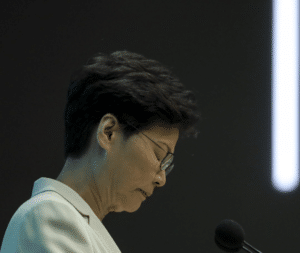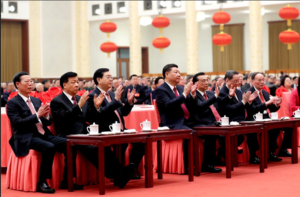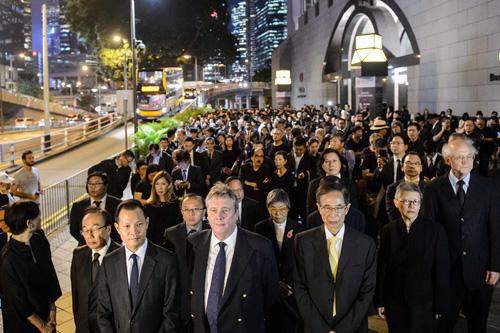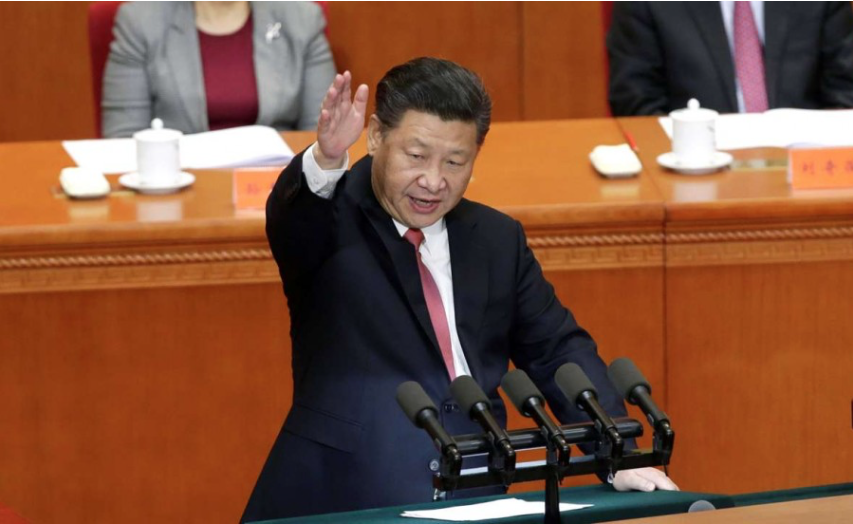The world watched anxiously as two million people marched in the streets of Hong Kong on Sunday. They were demanding Carrie Lam, the territory’s China-anointed chief executive, withdraw an extradition bill that would allow anyone arrested in Hong Kong to face trial in China.
To everyone’s relief, cooler heads prevailed. There was no repeat of the violence that marred a similar march last week. Granted, that violence resulted in only one person dying from an accidental fall and relatively few sustaining injuries – mostly from engaging in ill-advised skirmishes with the police.
 In any event, Lam held an extraordinary press conference today, during which she offered her “most sincere apology” and agreed to suspend execution of the bill at issue.
In any event, Lam held an extraordinary press conference today, during which she offered her “most sincere apology” and agreed to suspend execution of the bill at issue.
But the chief executive insisted that she could not accept protesters’ demands such as withdrawing the bill, stepping down, or promising police would not charge anyone arrested over the recent protests.
(South China Morning Post, June 18, 2019)
Therefore, the stage is set for a test of wills not seen since pro-democracy protesters took to Tiananmen Square 30 years ago. Ironically, those protesters were demanding the democratic freedoms their compatriots in then British Hong Kong enjoyed.
 Of course, we all know how their protests turned out. And I fear China’s authoritarian leaders will have their way again – by any means necessary. This, even if that means serving Lam as a sacrificial lamb to these baying Hong Kongers.
Of course, we all know how their protests turned out. And I fear China’s authoritarian leaders will have their way again – by any means necessary. This, even if that means serving Lam as a sacrificial lamb to these baying Hong Kongers.
I have marched (virtually) in solidarity with pro-democracy protesters across the globe. Indeed, my June 17 commentary attests that I am marching with Sudan’s pro-democracy protesters as I write this.
Therefore, you might think I’d be marching with those taking to the streets in Hong Kong. But I am not. (In fact, I resent the coverage global media are dedicating to these protesters while practically ignoring those in Sudan.)
As it happens, we’ve watched similar marches of defiance before. And I duly commented, including most ominously in “Hong Kong Protesters Raise Spectre of Tiananmen Square 2.0,” September 23, 2014.
But, all things considered, I shall suffice to reprise “China Vows to Crush Hong Kong-Led Confederacy; and It Should,” November 15, 2016. It explains my position on Hong Kong. It also explains why, when all is said and done, China will have its way.
Bear in mind that, if it allows Hong Kongers to defy its central authority, Taiwanese will only be emboldened to do the same. And, yes, taming Hong Kong is all about reclaiming Taiwan – too. For more on this twinning spectre, I refer you to “China Lays Claim to Taiwan,” January 3, 2019.
With that, here is “China Vows to Crush Hong Kong-Led Confederacy; and It should”:
*********
A week ago today, thousands of lawyers donned black suits and marched silently through Hong Kong. They did so to protest Mainland China’s decision to bar two elected legislators from serving in their local legislature.
[The legislators’] specific offense (at least in the eyes of Beijing) was to unfurl a banner proclaiming ‘Hong Kong Is Not China’ and to pronounce the country’s name in a derogatory manner during their swearing-in.
(TIME, November 13, 2016)
I have been sounding alarms for years about China as a more formidable and foreboding superpower than the Soviet Union. I’ve written many commentaries to this effect, including “Gap Between Rich and Poor in Communist China Is Sowing Seeds of Resentment and Terminal Unrest,” December 22, 2005, “Punishing China for Its Brutal Crackdown in Tibet? Hardly!” July 28, 2008, and “China Buying the Global Influence Russia and US Fighting For,” October 19, 2016.
Therefore, you might think I marched (virtually) in solidarity with those lawyers in Hong Kong. But I did not.
This … reminds me of the British who ruled Hong Kong as colonial despots for 150 years. Then, when the time came to return the territory to China, they suddenly decided that – for the sake of humanity and all that is fair and just – the people of Hong Kong must have democracy!
(“US Ports Now Have Arab Harbormasters… So What!” The iPINIONS Journal, February 21, 2006)
As one who lived under British colonialism, I appreciate why its colonial rule is preferable to China’s communist rule. But my national/racial pride is such that I have little sympathy for Chinese residents in Hong Kong who consented to be governed by British colonialists, but are refusing to be governed by Chinese nationalists. Besides, the issue here is not between colonialism and communism; it’s between national unity and regional secession.
Frankly, solidarity with Hong Kongers who want independence from China is tantamount to solidarity with Texans or Californians who want independence from the United States. Therefore, one can hardly blame Chinese President Xi Jinping for acting pursuant to the same principle that compelled US President Abraham Lincoln to preserve the union … by any means necessary. No matter the peculiarity of any state (or territorial) law, federal (or NPC Standing Committee) law supersedes it. Period!
Hence President Xi’s Lincolnesque warning:
All activities that intend to divide the country will certainly be firmly opposed by all Chinese people. We will never allow any one, any organisation, any party to split off any tract of territory from China anytime, or in any way.
(South China Morning Post, November 11, 2016)
Perhaps the extraordinary length to which British Prime Minister Margaret Thatcher went to preserve the United Kingdom is more instructive:
Twenty-five years ago, the British considered the Falkland Islands so vital to their sovereignty that they dispatched their armada to assert dominion over them. They did so because the islanders were poised to pledge allegiance to neighboring Argentina. Never mind that the Falklands were little more than a bleak and desolate cluster of islands situated 8,000 miles away.
(“Recognizing (or Regretting) Kosovo Independence,” The iPINIONS Journal, February 17, 2008)
Let’s face it, more countries recognize Hong Kong as part of China today than those that recognized the Falklands as part of the UK back then. This is why, instead of marching in solidarity with those lawyers last Tuesday, I would’ve been more inclined to march in solidarity with the pro-China Hong Kongers who took to the streets on Sunday to denounce them.
And, as alluded to above, I cannot overstate how damning it is that pro-democracy protesters are accusing China of using British colonial law to suppress their (belated) cries for freedom. The irony is too precious for words.
But there’s no escaping the inconvenient truth that these protests amount to nothing more than a self-hating, Stockholm Syndrome-like preference for the British over the Chinese. Indeed, you’d be forgiven for thinking that these Hong Kongers don’t want democracy so much as a return to British colonial rule.
Related commentaries:
Gap between rich and poor…
Punishing China…
China buying influence…
Arab harbormasters…
Kosovo…
*********
That said, I trust it’s obvious why the support former President Obama offered these pro-democracy protesters amounted to nothing more than platitudes about democratic freedoms. After all, it would’ve been tantamount to supporting secessionist movements in the United States if he had supported the aspirations of Hong Kongers to secede from China. Further, if he supported them, he’d have to explain why he never supported the Uyghurs — who began struggling for secession from China long before it even occurred to these Hong Kongers.
And don’t get me started on the unsung democratic aspirations of Tibetans. Instead I’ll refer you to “Punishing China for Its Brutal Crackdown in Tibet? Hardly,” July 28, 2008.
In a similar vein, I trust it’s obvious why President Trump is loath even to offer platitudes. After all, he has demonstrated a willingness to sellout American democracy to China for the mere promise of a Trump casino in Macau (or to North Korea for the mere promise of a beachfront resort in Pyongyang).
Hong Kong spectre of Tiananmen…
China vows to crush Hong Kong…
Sudan’s delayed Arab Spring…
China claims Taiwan…
Tibetans…



